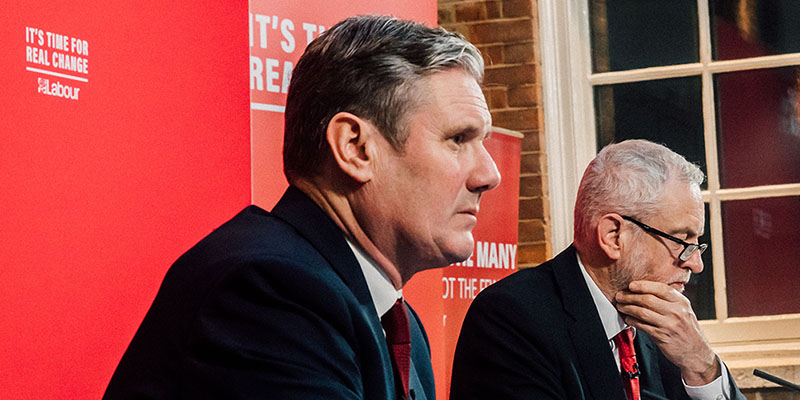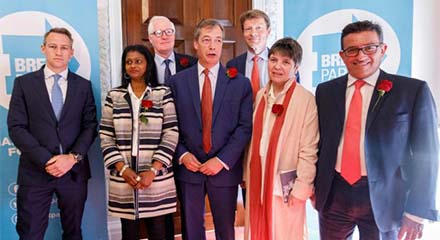James Harvey reports on the stage-managed Labour conference, the courting of big business and unconditional support for Israeli colonial oppression
Apart from the incident involving Yaz Asmawi, the People Demand Democracy protestor, who covered Sir Keir Starmer with green glitter (and which he was able to turn to his advantage with a stoic one-liner on the differences between ‘protest’ and ‘power’) the Labour conference went completely according to plan for the party’s machine.
Everyone on the platform and in the hall was on message, while delegates enthusiastically cheered and gave the required standing ovations for fairly mundane rhetoric and largely content-free speeches. It was the very model of a modern party conference – more of a carefully choreographed theatrical performance than a political event, with carefully framed sets and Union Jack backdrops and almost flawlessly managed throughout. Even the unscripted ‘defeats’ on energy and rail nationalisation were used to good effect by the Labour leadership to demonstrate that, whatever the conference proposed, it would be Sir Keir who disposed.
Compared with previous years the corporations were everywhere: Goldman Sachs, Boeing, Google sponsoring special events. At evening receptions CEOs shmoozed with shadow cabinet members. The FT even dubbed it “Liverpool Davos”. And the money is pouring in from companies and rich individuals, now that “Labour is the party of all businesses”: £8.6 million of it so far in 2023 (more than trade union contributions).
In that sense, this year’s Liverpool conference was just the latest stage in the Starmer project to make Labour the preferred eleven for capitalism and demonstrate his credentials as a reliable, alternative prime minister. With the chaos of Boris Johnson and his “fuck business” approach, the shambles of Liz Truss and Rishi Sunak’s complete lack of strategic thinking (apart from a desperation to avoid a drubbing in 2024), Labour’s managers think they have it in the bag … unless there is some kind of almighty blunder. So steady as she goes is the message.
With just over a year expected before the next election, the Labour leadership has to persuade the largely mythical ‘centre ground’ of Labour’s ‘responsibility’ and ‘credibility’: code for Tory voters. Sir Keir’s electoral strategy of triangulation was clearly on display in shadow chancellor Rachel Reeves’ speech on the economic programme of the next Labour government, as well as framing the leader’s keynote speech on October 10.
Charm offensive
Reeves built on the pro-business line that she had been setting out in interviews with the Financial Times and during her charm offensive in the boardrooms over the past three years, with promises of fiscal discipline and responsibility: economic growth would not be generated through higher taxation and the unsustainable stimulus of government borrowing, but through a new relationship with business and a state-backed National Wealth Fund – to all intents and purposes, a rebranding of the Blair government’s ‘private-public partnerships’, albeit in the very different and much less favourable capitalist economy of the 2020s.
For this commitment to ‘realistic politics’, she was rewarded by the endorsement of former Bank of England governor Mark Carney and the rather favourable response from other business leaders, who saw her as a politician and potential future leader they could work with. So, after the disorder and uncertainties of the Corbyn years, the capitalist class can be reassured that rightwing ‘order’ has finally been restored.
If Rachel Reeves set out the pro-capitalist framework of the next Labour government’s economic programme, essentially maintaining the status quo with vague commitments to growth and “rebuilding Britain”, it was left to Sir Keir to draw the threads together to reach the “inner soul of the British people” and provide potential Labour voters with an uplifting vision of “getting Britain’s future back”. His speech was received rapturously in the conference hall and attracted a record number of standing ovations, with the shadow cabinet team and others on the stage acting as a claque, engaging in a competitive form of sycophantic gymnastics to see who could stand up most frequently and more quickly than the rest. The anthemic dance music, and Starmer’s return to the stage after finishing his speech for an encore with his wife, only added to the theatrical atmosphere and the echoes of 1990s New Labour.
The content and the rhetoric of the speech also referenced Blairism, drawing on the ‘achievements’ of the Blair government and using a similar language of reform, renewal and rebuilding. There were few specific policy commitments beyond a promise to “bulldoze” planning restrictions to enable new development, create new towns and build 1.5 million homes – alongside nebulous proposals on local devolution of power away from Westminster and more ominous references to ‘reform’ (privatisation?) in the NHS and other public services.
This was a pre-election speech, in which the Labour leader was trying to set a tone, whilst leaving few hostages to fortune that could be dragged up by the Tories when the campaign proper begins. With his references to realism and the difficulties ahead, it was obvious that Starmer was promising very little.
Pro-imperialist
As if we needed any reminders, what we learnt from the speech is that the next Labour government will be the most rightwing and explicitly pro-capitalist in the party’s history.
Not only will it meet the needs of British capitalism and the dictates of the market domestically, but it will be a loyal servant of the constitutional order at home and the interests of British imperialism and the US hegemon internationally. Starmer underlined this with his references to the role of the 1945-51 Attlee government in founding Nato and Labour’s support for ‘the west’ during the cold war and beyond.
Starmer’s unconditional support for the Israeli state’s attack on Gaza and its continued oppression of the Palestinian people drew a very symbolic standing ovation, serving as a visual reminder that the massed Palestine flag waving at conference during the Corbyn years is now safely a thing of the past, though Labour has not gone quite as far as home secretary Suella Braverman in calling for police action against anyone displaying a Palestinian flag in public.
Naturally, Starmer repeated the big lie about anti-Semitism in the Labour Party under the Corbyn leadership, and smeared the left with his conflation of support for Palestinian rights and hostility to Jewish people. Thus, Starmer reassured the ruling class in London and Washington that the left had been finally defeated and that it was now his Labour Party, unquestionably loyal to the status quo at home and abroad, and ready to serve capitalism in whatever way was deemed necessary.
There was a hastily arranged demonstration outside the conference centre organised by local supporters of the Palestinian struggle, but in the conference itself the left kept its head down and raised not a peep on this issue. So, as well as providing the Labour leadership with an opportunity to stand solidly behind Washington and its Israeli client state, the bombing of Gaza also shows how far the Labour left has fallen and how retreat has degenerated into a political rout.
With Sir Keir meeting foreign prime ministers and heads of state, big money pouring into the coffers, success in by-elections and huge leads in opinion polls, there is now the real prospect of a Labour government. There is even talk of two terms and burying the Tories for a generation. The nonsense peddled by sections of the left that Sir Keir did not really want to beat the Tories, did not really want to get into No10 can be seen for what it really was all along – nonsense.
What passes for the official left therefore hides itself under vague calls for ‘boldness’: John McDonnell, Sharon Graham and Andrew Fisher being typical. ‘Left’ MPs do not want to be seen rocking the boat. The threat of deselection hangs over the head of every one of them. None wants to share the terrible fate of Jeremy Corbyn and Diane Abbott and find themselves without their parliamentary salary and expenses accounts. True, Momentum claims conference victories over energy and rails – due, in fact, to the trade union bloc vote – but as an organisation it was a much diminished force. In internal elections – National Constitutional Committee, Conference Arrangements Committee, National Women’s Committee – candidates of Labour to Win trounced the Centre-Left Grassroots Alliance by a margin of around 3:1. The World Transformed was itself a turgid and timid affair, though on the final day there was an informed session on solidarity with the Palestinian rebellion presented by the British chapter of the Palestinian Youth Movement.
The question of solidarity with the Palestinian struggle will, of course, be to the fore for the working class movement in Britain and internationally, especially given the way that US imperialism and its Nato clients have rallied behind Israel’s war. Like the Tory government, Sir Keir has attempted to delegitimise support for Palestinian rights and opposition to Israeli repression by smearing the left and the Palestinian solidarity movement with false accusations of anti-Semitism. In that he is, disgracefully, being urged on by the likes of the Alliance For Workers’ Liberty and turncoats such as Paul Mason – from Workers Power to warmonger. He desperately wants to become an MP and – who knows? – eventually defence minister in a Starmer government.






